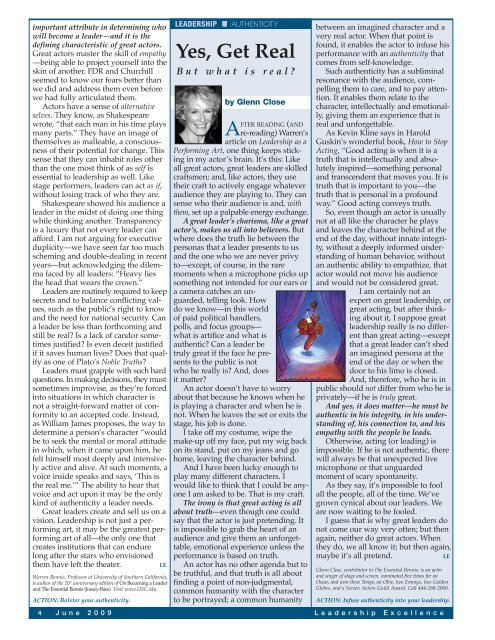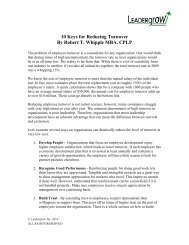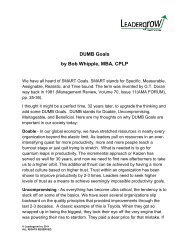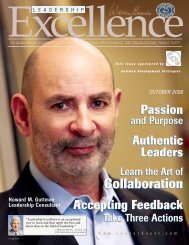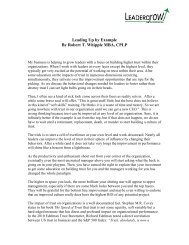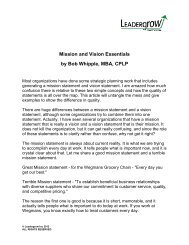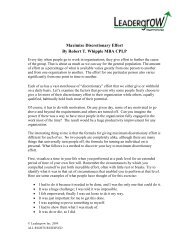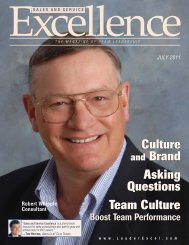Think Again - Powered by ZD-CMS
Think Again - Powered by ZD-CMS
Think Again - Powered by ZD-CMS
You also want an ePaper? Increase the reach of your titles
YUMPU automatically turns print PDFs into web optimized ePapers that Google loves.
important attribute in determining whowill become a leader—and it is thedefining characteristic of great actors.Great actors master the skill of empathy—being able to project yourself into theskin of another. FDR and Churchillseemed to know our fears better thanwe did and address them even beforewe had fully articulated them.Actors have a sense of alternativeselves. They know, as Shakespearewrote, “that each man in his time playsmany parts.” They have an image ofthemselves as malleable, a consciousnessof their potential for change. Thissense that they can inhabit roles otherthan the one most think of as self isessential to leadership as well. Likestage performers, leaders can act as if,without losing track of who they are.Shakespeare showed his audience aleader in the midst of doing one thingwhile thinking another. Transparencyis a luxury that not every leader canafford. I am not arguing for executiveduplicity—we have seen far too muchscheming and double-dealing in recentyears—but acknowledging the dilemmafaced <strong>by</strong> all leaders: “Heavy liesthe head that wears the crown.”Leaders are routinely required to keepsecrets and to balance conflicting values,such as the public’s right to knowand the need for national security. Cana leader be less than forthcoming andstill be real? Is a lack of candor sometimesjustified? Is even deceit justifiedif it saves human lives? Does that qualifyas one of Plato’s Noble Truths?Leaders must grapple with such hardquestions. In making decisions, they mustsometimes improvise, as they’re forcedinto situations in which character isnot a straight-forward matter of conformityto an accepted code. Instead,as William James proposes, the way todetermine a person’s character “wouldbe to seek the mental or moral attitudein which, when it came upon him, hefelt himself most deeply and intensivelyactive and alive. At such moments, avoice inside speaks and says, ‘This isthe real me.’” The ability to hear thatvoice and act upon it may be the onlykind of authenticity a leader needs.Great leaders create and sell us on avision. Leadership is not just a performingart, it may be the greatest performingart of all—the only one thatcreates institutions that can endurelong after the stars who envisionedthem have left the theater.LEWarren Bennis, Professor at University of Southern California,is author of the 20 th anniversary edition of On Becoming a Leaderand The Essential Bennis (Jossey-Bass). Visit www.USC.edu.ACTION: Bolster your authenticity.LEADERSHIPAUTHENTICITYYes, Get RealBut what is real?<strong>by</strong> Glenn CloseAFTER READING (ANDre-reading) Warren’sarticle on Leadership as aPerforming Art, one thing keeps stickingin my actor’s brain. It’s this: Likeall great actors, great leaders are skilledcraftsmen; and, like actors, they usetheir craft to actively engage whateveraudience they are playing to. They cansense who their audience is and, withthem, set up a palpable energy exchange.A great leader’s charisma, like a greatactor’s, makes us all into believers. Butwhere does the truth lie between thepersonas that a leader presents to usand the one who we are never privyto—except, of course, in the raremoments when a microphone picks upsomething not intended for our ears ora camera catches an unguarded,telling look. Howdo we know—in this worldof paid political handlers,polls, and focus groups—what is artifice and what isauthentic? Can a leader betruly great if the face he presentsto the public is notwho he really is? And, doesit matter?An actor doesn’t have to worryabout that because he knows when heis playing a character and when he isnot. When he leaves the set or exits thestage, his job is done.I take off my costume, wipe themake-up off my face, put my wig backon its stand, put on my jeans and gohome, leaving the character behind.And I have been lucky enough toplay many different characters. Iwould like to think that I could be anyoneI am asked to be. That is my craft.The irony is that great acting is allabout truth—even though one couldsay that the actor is just pretending. Itis impossible to grab the heart of anaudience and give them an unforgettable,emotional experience unless theperformance is based on truth.An actor has no other agenda but tobe truthful, and that truth is all aboutfinding a point of non-judgmental,common humanity with the characterto be portrayed; a common humanitybetween an imagined character and avery real actor. When that point isfound, it enables the actor to infuse hisperformance with an authenticity thatcomes from self-knowledge.Such authenticity has a subliminalresonance with the audience, compellingthem to care, and to pay attention.It enables them relate to thecharacter, intellectually and emotionally,giving them an experience that isreal and unforgettable.As Kevin Kline says in HaroldGuskin’s wonderful book, How to StopActing, “Good acting is when it is atruth that is intellectually and absolutelyinspired—something personaland transcendent that moves you. It istruth that is important to you—thetruth that is personal in a profoundway.” Good acting conveys truth.So, even though an actor is usuallynot at all like the character he playsand leaves the character behind at theend of the day, without innate integrity,without a deeply informed understandingof human behavior, withoutan authentic ability to empathize, thatactor would not move his audienceand would not be considered great.I am certainly not anexpert on great leadership, orgreat acting, but after thinkingabout it, I suppose greatleadership really is no differentthan great acting—exceptthat a great leader can’t shedan imagined persona at theend of the day or when thedoor to his limo is closed.And, therefore, who he is inpublic should not differ from who he isprivately—if he is truly great.And yes, it does matter—he must beauthentic in his integrity, in his understandingof, his connection to, and hisempathy with the people he leads.Otherwise, acting (or leading) isimpossible. If he is not authentic, therewill always be that unexpected livemicrophone or that unguardedmoment of scary spontaneity.As they say, it’s impossible to foolall the people, all of the time. We’vegrown cynical about our leaders. Weare now waiting to be fooled.I guess that is why great leaders donot come our way very often; but thenagain, neither do great actors. Whenthey do, we all know it; but then again,maybe it’s all pretend.LEGlenn Close, contributor to The Essential Bennis, is an actorand singer of stage and screen. nominated five times for anOscar, and won three Tonys, an Obie, two Emmys, two GoldenGlobes, and a Screen Actors Guild Award. Call 444-288-2000.ACTION: Infuse authenticity into your leadership.4 June 2009 Leadership Excellence


